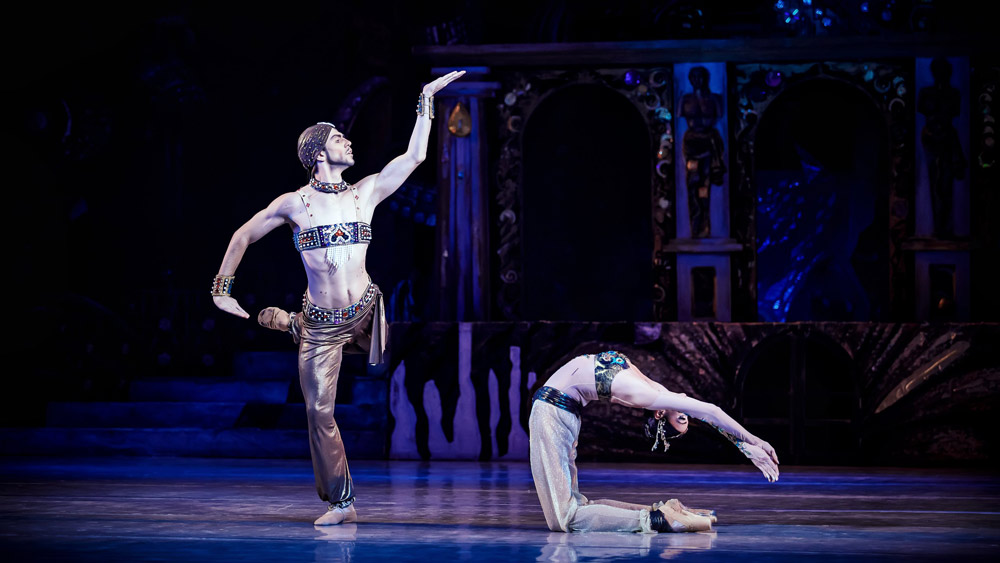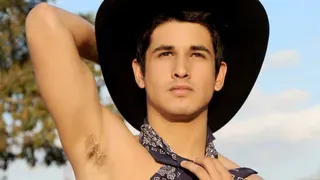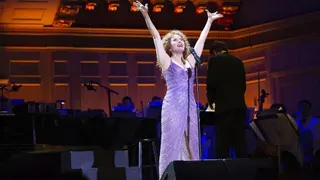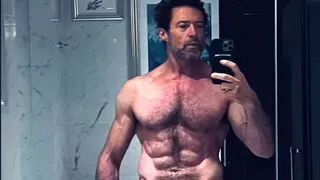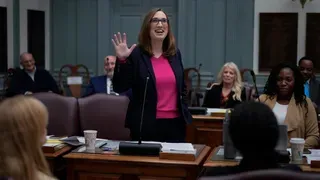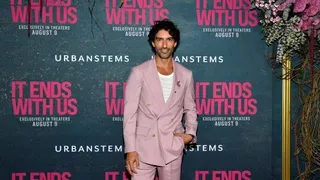June 5, 2024
Inside the Queer World of Netflix's 'Eric' with Abi Morgan & McKinley Belcher III
Frank J. Avella READ TIME: 11 MIN.

EDGE: McKinley, it's so refreshing to see a complicated, nuanced, flawed, gay character on screen, where we don't have to be so careful about him being heroic. He is heroic, but he's a character a lot of us can relate to.
McKinley Belcher III: It's refreshing to play, too, because it's a whole human. And that's not something that you always encounter in the shows. [Turns to Abi] It's a gift that I'm eternally grateful for.
Abi Morgan: Thank you. Mutual.
EDGE: Abi, the show has this gritty realism, despite the obviously fantastical bit. It reminded me of the Lumet and Scorsese films of the '70s. Was this something you were striving for?
Abi Morgan: Oh, my gosh! I wish Lucy Phillips, the brilliant director, was here to hear you say that. I think it was absolutely key. All our reference points were those '70s movies, those early '80 movies. The writing of Paul Schrader was brilliant. I love "Taxi Driver." I love that whole period of filmmaking. But, also, I love the beautiful brutality of "Kramer vs Kramer." So, for me, there was a palette and there was a landscape where New York was a character within itself that felt so important. This is about people who are responding to living in this incredibly diverse, complicated city. We could have set it in Berlin, London... But there is a kind of exquisite elegance, and yet darkness, to New York, which I find very haunting and beautiful on film. I think it's something that really inspired, and certainly was part of the kind of palette and sensibilities that we talked about when we were discussing the making of the show.
EDGE: In terms of the early days of the AIDS crisis, there was so much anxiety and fear surrounding the disease, and homophobia reached new heights. We seem to have gone a bit backwards when it comes to queer acceptance in many parts of the world today. Can you speak a little bit about the crazy parallels with the '80s and now?
McKinley Belcher III: It's one of the things I'm most proud (of) with this show – this thing that feels like a thriller in some way, and it's whimsical and weird in a beautiful way – that we're also honestly capturing the experience of the AIDS epidemic. And looking at a couple navigate what it feels like to know you're about to lose someone, and be mourning them before they're even gone. And then you have these things at work that are vying for your attention and time. And then having people almost weaponize your sexuality and your love in a way that deny you the full experience of what it is that you're forced to endure. So, I'm really proud that all of that gets fully investigated over the course of the show.
I think it's beautifully acted, especially with Mark Gillis, who plays William. I'm very proud of it. And it's important, especially for people who were not alive at that time and who may not fully comprehend or understand the weight of what it is to carry [that], to not fully understand what's happening around you and be losing people and feel in danger. And what that weight is to carry day to day. I think that is lived in and captured on the show.
EDGE: Abi, you're a rather fearless writer. "Shame" is a great example of a daring piece that we didn't quite appreciate here in the U.S., among your fearless works.
Abi Morgan: Growing up in the '80s as a teenager, I think in many ways I wrote, and I'm always writing, for those young gay men who I saw hiding their sexuality because their sexuality was being weaponized against them at a time when there was so much fear. I don't know if it's fearlessness, it's more just a desire to write what you feel and see and want expressed in the world... I think what's terrifying is so many of the issues that we are dealing with within this mid '80s period is as resonant today as it was then. There are those violations still going on against human rights and all of these issues around the way we ignore the underclass. There are so many things in that that feel resonant. I just try and write about what I still feel is relevant to today.
McKinley Belcher III: And that's the gig, to hold the mirror up and say, "This is us."
Abi Morgan: This is us. Yeah, exactly.

EDGE: You both frequently work in all three mediums: TV, theatre, and film. The first two can almost be seen as writer's mediums. Can you speak about the differences you find and, maybe, similarities and what your preference might be? Shout out to you, McKinley, for your remarkable performance in "Death of a Salesman" on Broadway!
McKinley Belcher III: Thank you. First, with "Death of a Salesman," I never knew that would have been possible, to be on Broadway as a Black man playing Happy Loman, and to be in the midst of a family that looks like me. When I read that story as a freshman in high school, I never thought of it as being about me. And the fact that there are young men who came to see the show, and their first experience with Arthur Miller's work is that it's about them, is beautiful.
When I think about theater, I often think of it as my first love. I really enjoy doing the work on camera for film and TV, but my first love will always be the theater. There are a lot of similarities about how I approached the work, because, ultimately, it's still all about truth and about telling a story. But when I get on camera, it feels like having less responsibility, because when I'm on stage, I'm responsible for having a truthful experience, and responsible for sharing it with an audience. When I get on set, I'm only responsible for having a truthful experience. It's someone else's job to capture and share it with the people, so it somehow always feels like slightly less of a responsibility... I don't have to think about how it's captured. I just have to have a truthful thing going on. But I really love storytelling, so whatever medium I can do it in, that's the one I'll do.
Abi Morgan: I always say to young writers, "Try and write some theater. Theater is you and a chair on a stage, and hopefully your mama, if nothing else. You don't really need anything more than that." Whereas, as soon as you get into screenplay writing, you need everybody else to help you make it. And there's a freedom to theater writing, which I miss within my own writing now. It's something that I feel like I need to get back to, because I think it's really where you find your voice. It's such an authored, uneditorial space to be in. You don't get your lines cut and pasted. Screenwriting is brutal. And TV writing is really brutal. Maybe it gets less brutal the more experience you get, because you know which battles to fight, but what I love about screenwriting is the fact I could get rid of the monologue... those monologues, which I often fall in love with on the stage, just didn't quite work in the same way onscreen. Suddenly, the image could do that...I'm so grateful for my theater writing, and I'll always go back to it. Weirdly, when the pandemic was over, the thing I needed more than anything was to go to the theater. I wanted that live experience of being in an audience again... I needed it to make me better at my screenwriting...
McKinley Belcher III: It always feels like a grand act of generosity to me when I'm on stage. And there's something communal and almost spiritual about being in a dark room. And we all gathered around these ideas and this story, in these hearts, to experience what it is to be human.
Abi Morgan: [To McKinley] I love the fact you've used 'heart,' like, three or four times now. It so sums you up. Your performance has incredible heart. Not everybody has that.
McKinley Belcher III: Thank you.
"Eric" is streaming on Netflix.
Frank J. Avella is a proud EDGE and Awards Daily contributor. He serves as the GALECA Industry Liaison and is a Member of the New York Film Critics Online. His award-winning short film, FIG JAM, has shown in Festivals worldwide (figjamfilm.com). Frank's screenplays have won numerous awards in 17 countries. Recently produced plays include LURED & VATICAL FALLS, both O'Neill semifinalists. He is currently working on a highly personal project, FROCI, about the queer Italian/Italian-American experience. He is a proud member of the Dramatists Guild. https://filmfreeway.com/FrankAvella https://muckrack.com/fjaklute
